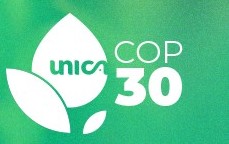
UNICA at COP30 – “Green Kitchens: the role of clean cooking and bioenergy in promoting gender equity and health”
COP30 - Green Zone - Global Biofuels Alliance PavilionPanel promoted by Global Biofuels Alliance.

Panel promoted by Global Biofuels Alliance.

This panel will discuss how ethanol produced in Brazil offers an immediate, scalable, and sustainable solution to decarbonize maritime sector.

With the Global Stocktake and UAE Consensus as a foundation for the energy transition, the panel will assess how expanding biofuel use can advance global climate goals, drawing on national experiences and exploring opportunities for international cooperation and investment.

Balancing agricultural production, environmental protection, and sustainable energy is key to tackling climate change. This event will showcase successful models and policies linking agriculture and bioenergy, emphasizing innovation, research, and global cooperation while ensuring food security and inclusive benefits for rural communities.

This event will showcase technological, regulatory, and economic advancements in liquid biofuels that are driving cleaner mobility across land and air transport. Discussions will explore how emerging technologies and supportive policies can accelerate emissions reductions while promoting energy security and sustainable growth.

This panel will explore how innovation, digitalization, and policy can transform agribusiness into a clean energy driver—boosting efficiency, enabling circular economy solutions, and advancing a sustainable bioeconomy.

This session will bring together representatives from public and private sector to explore the barriers and pathways to building a robust international SAF market, emphasizing solutions that combine technological innovation, financial instruments, regulatory coherence, and international cooperation to make SAF a cornerstone of global aviation decarbonization.

Panelists will debate how blending mandates and regulatory frameworks can serve as powerful tools for countries to achieve their decarbonization targets, strengthen energy security, and promote economic development—particularly in emerging economies.

The panel will address the technological, regulatory, and financial challenges to scaling up carbon-negative solutions within the context of sustainable fuels, highlighting opportunities for innovation, collaboration, and policy integration that can accelerate the development of projects capable of delivering permanent carbon removals.

Panelists will reflect on opportunities and challenges of expanding sustainable fuel use in the maritime sector, focusing on how biofuels can complement other low-carbon technologies to help countries meet IMO targets and advance a sustainable global shipping economy.

This panel tackles short-term opportunities for the bioenergy sector in regulated and voluntary carbon markets, discuss regulatory and methodological challenges, and assess expectations regarding the implementation of Paris Agreement market mechanisms.

The session will showcase the Brazilian Agribusiness Decarbonization Coalition's progress and how agribusiness can drive a sustainable transformation that balances climate mitigation, adaptation, and competitiveness. It will highlight collaborative pathways to scale low-carbon practices and discuss integrating agribusiness decarbonization into national policies and international commitments, showcasing Brazil’s potential as a global leader in sustainable agriculture.